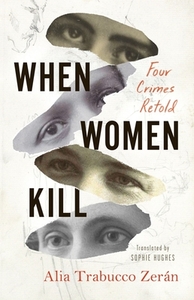Take a photo of a barcode or cover
dark
informative
reflective
sad
medium-paced
challenging
dark
informative
reflective
slow-paced
El true crime no es lo mío, está claro. Pero además, es que esto no me funciona. Es aburridísimo. No es ficción, pero tampoco un ensayo o un "documental". Parece neutral, pero en realidad sí emite juicios de valor. En fin, no sé, no es lo mío.
dark
informative
reflective
medium-paced
“Female violence challenges the norms defining womanhood itself. Female violence begs a critical reevaluation of the invisible gender laws—the laws that equate femininity with weakness and submission, and that fuel inequality and violence every single day.”
A very interesting book! I'm not really a true crime person, but this was truly absorbing. I really like the author's reflection on how the anger, violence, and aggression of women is seen and portrayed both today and in Chile of the past, which is not so different from the US. All four of the women in this book had very legitimate reasons to be angry (though Geel never explained her exact motivations), but their anger was ignored at every single turn.
One thing the author said that I had never really put together is that men's honor depends on the actions of their wives, and that's why it's not a problem if a man has an affair (which asserts his masculinity), but it is if his wife does. And in Chile, a woman committing adultery could be exiled from the country as it was even considered an act of treason! Wild.
I found Faúndez's case to be the most interesting, since she was a working class woman who killed her husband with her bare hands 😲 and seemed the most violent and gruesome of the four. And her case really bothered the general public because everyone was convinced that there was no way for a woman to chop a body up into pieces. The other cases were still very interesting though, especially Geel's since she essentially wrote an entire book on her prison experience (scandalous at the time though because it hinted at lesbianism in prisons). Rojas' was interesting since she essentially hired a man to kill her husband, but the court believed that the man who did it deserved more leniency than her. I also really liked the author's reflections on Alfaro's case, since the class difference between her and her victims and her legitimate grievances as a domestic worker added a whole different dimension.
The author added some diary entries throughout recounting her process of finding sources and gathering evidence, and at first I really liked them since it's nice to see behind the scenes. But they eventually started to become grating, especially in the last chapter, when the author literally wrote, "who am I in the story?" because she didn't know what POV she wanted to tell Alfaro's story from. And it just started feeling a bit pretentious and too literary-leaning for me. I also didn't like that the first third of Alfaro's chapter consisted of what appeared to be Alfaro's testimony, but was never explained. Was that actually her words, or the author's? There didn't seem to be a source for it in the back (also another pet peeve of mine, no footnotes!!) so I think it's the author making it up but she didn't do that for any of the other women so I don't understand why she did that. It also made the case seem very different from what it ended up being, like this is supposed to be a thriller with twists and turns instead of historical non-fiction. Idk man, I just really didn't like that that was never clarified.
I saw another review mention this so I was prepared, but it was pretty wild for the author to say "the press printed photos unlikely to be shown to the general public today" and then shared the gruesome photos on the next page. Like come on now...
One thing that was interesting in the epilogue is that Chile has never executed any woman for violent crimes, but has executed 55 men. All women have been pardoned. The author goes on to argue that this is because executing a woman would mean acknowledging that she was not hysterical but acted with purpose and intent. And that does make sense, but right before that she compared this with the US, which has executed 55 women since 1900 (and 8000+ men so a small percentage but still non-zero). But she doesn't say anything about what this means for the US. I know this is a book focused on Chile but it's interesting that she would bring that up to compare and then not analyze the difference.
Overall, this is a very interesting book, and I would recommend to anyone looking for a fairly quick feminist read focusing on Chile.
dark
informative
reflective
fast-paced
informative
reflective
sad
When Women Kill was sadly just not what I expected. I found the retellings disjointed and without much purpose, and I didn't feel as though Zerán had an overall thesis to connect the crimes together.
challenging
dark
informative
medium-paced
dark
informative
medium-paced
Is it weird to say I enjoyed reading this book, even though it’s about women who kill people? Oh well—I really enjoyed this! It was incredibly well written and translated. I found the writing style super engaging, with each chapter punctuated by journal entries from the author’s research. The only reason this wasn’t a 5 star is because the emphasis on how the crimes became woven into arts/culture felt a bit… forced? But overall, highly reccomend.
𝐖𝐡𝐞𝐧 𝐖𝐨𝐦𝐞𝐧 𝐊𝐢𝐥𝐥: 𝐅𝐨𝐮𝐫 𝐂𝐫𝐢𝐦𝐞𝐬 𝐑𝐞𝐭𝐨𝐥𝐝 𝐥𝐨𝐨𝐤𝐬 𝐚𝐭 𝐟𝐨𝐮𝐫 𝐦𝐮𝐫𝐝𝐞𝐫𝐬 𝐛𝐲 𝐂𝐡𝐢𝐥𝐞𝐚𝐧 𝐰𝐨𝐦𝐞𝐧 𝐢𝐧 𝐭𝐡𝐞 𝟐𝟎𝐭𝐡 𝐜𝐞𝐧𝐭𝐮𝐫𝐲. 𝐀𝐥𝐢𝐚 𝐓𝐫𝐚𝐛𝐮𝐜𝐜𝐨 𝐙𝐞𝐫𝙖𝙣 𝐬𝐡𝐨𝐰𝐬 𝐡𝐨𝐰 𝐭𝐡𝐞𝐬𝐞 𝐰𝐨𝐦𝐞𝐧 𝐰𝐞𝐫𝐞 𝐛𝐨𝐭𝐡 𝐜𝐫𝐢𝐦𝐢𝐧𝐚𝐥𝐬 𝐚𝐧𝐝 𝐯𝐢𝐜𝐭𝐢𝐦𝐬, 𝐜𝐡𝐚𝐥𝐥𝐞𝐧𝐠𝐢𝐧𝐠 𝐜𝐨𝐦𝐦𝐨𝐧 𝐢𝐝𝐞𝐚𝐬 𝐚𝐛𝐨𝐮𝐭 𝐟𝐞𝐦𝐚𝐥𝐞 𝐤𝐢𝐥𝐥𝐞𝐫𝐬 𝐚𝐧𝐝 𝐚𝐬𝐤𝐢𝐧𝐠 𝐰𝐡𝐲 𝐰𝐨𝐦𝐞𝐧 𝐬𝐨𝐦𝐞𝐭𝐢𝐦𝐞𝐬 𝐛𝐫𝐞𝐚𝐤 𝐟𝐫𝐞𝐞 𝐟𝐫𝐨𝐦 𝐭𝐫𝐚𝐝𝐢𝐭𝐢𝐨𝐧𝐚𝐥 𝐫𝐨𝐥𝐞𝐬 𝐚𝐧𝐝 𝐡𝐨𝐰 𝐬𝐨𝐜𝐢𝐞𝐭𝐲 𝐫𝐞𝐬𝐩𝐨𝐧𝐝𝐬
𝘛𝘩𝘦 𝘣𝘰𝘰𝘬 𝘵𝘦𝘭𝘭𝘴 𝘵𝘩𝘦 𝘴𝘵𝘰𝘳𝘪𝘦𝘴 𝘰𝘧 𝘧𝘰𝘶𝘳 𝘸𝘰𝘮𝘦𝘯 𝘮𝘶𝘳𝘥𝘦𝘳𝘦𝘳𝘴 𝘣𝘶𝘵 𝘰𝘯𝘭𝘺 𝘧𝘰𝘤𝘶𝘴𝘦𝘴 𝘰𝘯 𝘴𝘩𝘰𝘳𝘵 𝘱𝘢𝘳𝘵𝘴 𝘰𝘧 𝘵𝘩𝘦𝘪𝘳 𝘭𝘪𝘷𝘦𝘴. 𝘛𝘩𝘦 𝘧𝘰𝘶𝘳𝘵𝘩 𝘴𝘵𝘰𝘳𝘺 𝘸𝘢𝘴 𝘸𝘦𝘭𝘭 𝘥𝘰𝘯𝘦 𝘢𝘯𝘥 𝘮𝘰𝘳𝘦 𝘪𝘯𝘵𝘦𝘳𝘦𝘴𝘵𝘪𝘯𝘨, 𝘣𝘶𝘵 𝘵𝘩𝘦 𝘰𝘵𝘩𝘦𝘳 𝘵𝘩𝘳𝘦𝘦 𝘧𝘦𝘭𝘵 𝘳𝘶𝘴𝘩𝘦𝘥 𝘢𝘯𝘥 𝘶𝘯𝘧𝘪𝘯𝘪𝘴𝘩𝘦𝘥. 𝘐 𝘸𝘢𝘯𝘵𝘦𝘥 𝘮𝘰𝘳𝘦 𝘥𝘦𝘵𝘢𝘪𝘭 𝘵𝘰 𝘣𝘦𝘵𝘵𝘦𝘳 𝘶𝘯𝘥𝘦𝘳𝘴𝘵𝘢𝘯𝘥 𝘵𝘩𝘦 𝘸𝘰𝘮𝘦𝘯 𝘢𝘯𝘥 𝘵𝘩𝘦𝘪𝘳 𝘢𝘤𝘵𝘪𝘰𝘯𝘴.
#aliatrabuccozerán #whenwomenkill
𝘛𝘩𝘦 𝘣𝘰𝘰𝘬 𝘵𝘦𝘭𝘭𝘴 𝘵𝘩𝘦 𝘴𝘵𝘰𝘳𝘪𝘦𝘴 𝘰𝘧 𝘧𝘰𝘶𝘳 𝘸𝘰𝘮𝘦𝘯 𝘮𝘶𝘳𝘥𝘦𝘳𝘦𝘳𝘴 𝘣𝘶𝘵 𝘰𝘯𝘭𝘺 𝘧𝘰𝘤𝘶𝘴𝘦𝘴 𝘰𝘯 𝘴𝘩𝘰𝘳𝘵 𝘱𝘢𝘳𝘵𝘴 𝘰𝘧 𝘵𝘩𝘦𝘪𝘳 𝘭𝘪𝘷𝘦𝘴. 𝘛𝘩𝘦 𝘧𝘰𝘶𝘳𝘵𝘩 𝘴𝘵𝘰𝘳𝘺 𝘸𝘢𝘴 𝘸𝘦𝘭𝘭 𝘥𝘰𝘯𝘦 𝘢𝘯𝘥 𝘮𝘰𝘳𝘦 𝘪𝘯𝘵𝘦𝘳𝘦𝘴𝘵𝘪𝘯𝘨, 𝘣𝘶𝘵 𝘵𝘩𝘦 𝘰𝘵𝘩𝘦𝘳 𝘵𝘩𝘳𝘦𝘦 𝘧𝘦𝘭𝘵 𝘳𝘶𝘴𝘩𝘦𝘥 𝘢𝘯𝘥 𝘶𝘯𝘧𝘪𝘯𝘪𝘴𝘩𝘦𝘥. 𝘐 𝘸𝘢𝘯𝘵𝘦𝘥 𝘮𝘰𝘳𝘦 𝘥𝘦𝘵𝘢𝘪𝘭 𝘵𝘰 𝘣𝘦𝘵𝘵𝘦𝘳 𝘶𝘯𝘥𝘦𝘳𝘴𝘵𝘢𝘯𝘥 𝘵𝘩𝘦 𝘸𝘰𝘮𝘦𝘯 𝘢𝘯𝘥 𝘵𝘩𝘦𝘪𝘳 𝘢𝘤𝘵𝘪𝘰𝘯𝘴.
#aliatrabuccozerán #whenwomenkill









